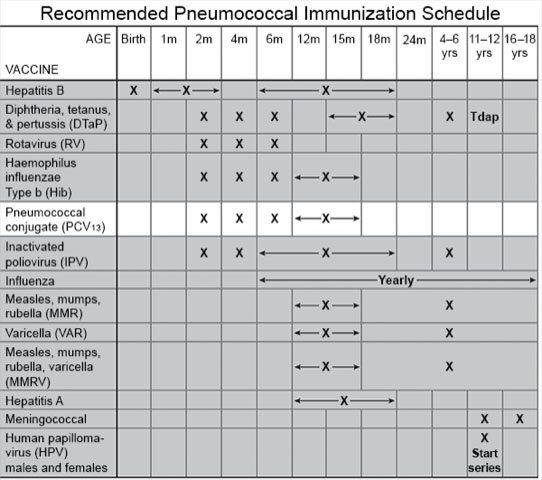Pneumococcal Vaccine for Children
Medically reviewed by Drugs.com. Last updated on Apr 6, 2025.
What is the pneumococcal vaccine?
The pneumococcal vaccine is given as a shot to protect your child from pneumococcal disease. Pneumococcal disease develops from an infection caused by pneumococcal bacteria. The infection may cause pneumonia or an ear infection. Pneumococcal disease is spread from person to person through coughing and sneezing. The vaccine comes in 2 forms, called pneumococcal conjugate vaccine (PCV) and pneumococcal polysaccharide vaccine (PPSV). Your child's healthcare provider will tell you which form is right for your child. The pneumococcal vaccine is often given with polio, hepatitis B, DTaP, and Hib vaccines. Your child may need these or other childhood vaccines at certain ages.
 |
When should my child get the pneumococcal vaccine?
- Children usually receive up to 4 doses of PCV:
- The first dose at 2 months
- The second dose at 4 months
- The third dose at 6 months
- The fourth dose at 12 to 15 months
- Catch-up doses may be given if your child has not received 1 dose of the vaccine by age 16 months. The number of catch-up doses depends on your child's age and health.
- Children 2 years or older who are at high risk for pneumococcal disease may need 1 or 2 doses of PPSV. Any of the following can increase your child's risk:
- A chronic heart, kidney, liver, or lung disease
- A cerebrospinal fluid leak or cochlear implant
- A damaged or removed spleen, diabetes, or sickle cell disease
- A weak immune system, HIV, cancer, or an organ transplant
What happens if my child misses a dose of the pneumococcal vaccine?
Your child will need 1 dose if he or she is 2 to 5 years old and is not completely vaccinated. If your child misses a scheduled dose, the remaining doses should still be completed. Ask your child's healthcare provider when to return for the next dose.
What are reasons my child should not get the pneumococcal vaccine?
Your child had an allergic reaction to the vaccine or to a vaccine for diphtheria, such as DTaP, Tdap, or Td. Tell your child's healthcare provider if your child had an allergic reaction to any other vaccine. Also tell the provider if your child has any serious allergies.
Drugs used to treat this and similar conditions
ProQuad
ProQuad is a measles, mumps, rubella and varicella virus vaccine. Includes age limits, schedule ...
Rotarix
Rotarix (rotavirus vaccine) is used to prevent rotavirus gastroenteritis in children. Includes ...
Omvoh
Omvoh is used to treat moderate to severe ulcerative colitis or Crohn's disease in adults. This ...
RotaTeq
Rotateq is a vaccine used to prevent rotavirus infection in children. Learn about side effects ...
Rotavirus vaccine
Rotavirus vaccine systemic is used for gastroenteritis, vaccination and prophylaxis
Measles virus vaccine/mumps virus vaccine/rubella virus vaccine/varicella virus vaccine
Measles virus vaccine/mumps virus vaccine/rubella virus vaccine/varicella virus vaccine systemic is ...
Treatment options
The following list of medications are related to or used in the treatment of this condition.
- measles virus vaccine/mumps virus vaccine/rubella virus vaccine/varicella virus vaccine
- ProQuad
- Rotarix
- RotaTeq
- rotavirus vaccine
What are reasons my child should wait to get the pneumococcal vaccine?
- Your child is sick or has a fever on the vaccine appointment day.
- Your young child is scheduled to get the influenza (flu) vaccine. Your child's provider can help you schedule the pneumococcal and flu vaccines.
- Your child is or may be pregnant. Your child's provider can tell you and your child the possible risks from the vaccine. Your child may still need to get the vaccine if the risk for pneumococcal disease is high.
What are the risks of the pneumococcal vaccine?
The area where the vaccine was given may be red, tender, or swollen. Your child may get a fever, be fussy or irritable, or have a decreased appetite. Your child may still get pneumococcal disease, even after getting the vaccine. Your child may have an allergic reaction to the vaccine. This can be life-threatening.
Call your local emergency number (911 in the US) if:
- Your child's mouth and throat are swollen.
- Your child is wheezing or has trouble breathing.
- Your child has chest pain or his or her heart is beating faster than usual.
- Your child faints.
When should I seek immediate care?
- Your child's face is red or swollen.
- Your child has hives that spread over his or her body.
- Your child feels weak or dizzy.
When should I call my child's doctor?
- Your child has increased pain, redness, or swelling around the area where the shot was given.
- You have questions or concerns about the pneumococcal vaccine.
Care Agreement
You have the right to help plan your child's care. Learn about your child's health condition and how it may be treated. Discuss treatment options with your child's healthcare providers to decide what care you want for your child. The above information is an educational aid only. It is not intended as medical advice for individual conditions or treatments. Talk to your doctor, nurse or pharmacist before following any medical regimen to see if it is safe and effective for you.© Copyright Merative 2025 Information is for End User's use only and may not be sold, redistributed or otherwise used for commercial purposes.
Learn more about Pneumococcal Vaccine for Children
Treatment options
Care guides
Medicine.com guides (external)
Further information
Always consult your healthcare provider to ensure the information displayed on this page applies to your personal circumstances.
